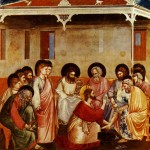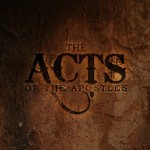Guest Blogger: The Keys of the Kingdom and Binding and Loosing
I’ve invited several people to write “guest blog posts” for this blog. There are several reasons for this: 1) To offer different perspectives. 2) To generate even more discussion and conversation between blogs. 3) To introduce other bloggers to my readers.
(If you are interested in writing a guest blog post, please contact me at aknox[at]sebts[dot]com.)
Today’s post was written by Jan Willem van Borselen. You can contact Jan via email at WhatsInScripture [at] gmail [dot] com.
—————————————
I enjoyed what Alan wrote about authority in the church. About two years ago I reached the same conclusion that the fact that Paul directed most of his letters at the churches and not at specific leaders, is very telling about how he viewed where authority in the church was placed: not with the “leadership” but within the community as a whole.
I also made, for me, a startling discovery that Jesus was addressing this in his teaching on the matter of binding and loosing. Having a charismatic background I heard a lot of teaching that didn’t do justice to what Jesus was really saying here.
In the Jewish Encyclopedia I found the following:
Binding and loosing
Rabbinical term for “forbidding and permitting”… The power of binding and loosing was always claimed by the Pharisees. Under Queen Alexandra, the Pharisees, says Josephus, “became the administrators of all public affairs so as to be empowered to banish and readmit whom they pleased, as well as to loose and to bind.” This does not mean that, as the learned men, they merely decided what, according to the Law, was forbidden or allowed, but that they possessed and exercised the power of tying or untying a thing by the spell of their divine authority, just as they could, by the power vested in them, pronounce and revoke an anathema upon a person.This power and authority, vested in the rabbinical body of each age or in the Sanhedrin, received its ratification and final sanction from the celestial court of justice.
The terms were in those days apparently closely associate with leaders exercising authority over other people, and not, as I was taught, with exercising authority over demons or situations.
Keeping this in mind while reading the following passage:
If your brother wrongs you, go and show him his fault, between you and him privately. If he listens to you, you have won back your brother. But if he does not listen, take along with you one or two others, so that every word may be confirmed and upheld by the testimony of two or three witnesses. If he pays no attention to them [refusing to listen and obey], tell it to the church; and if he refuses to listen even to the church, let him be to you as a pagan and a tax collector. Truly I tell you, whatever you forbid and declare to be improper and unlawful on earth must be what is already forbidden in heaven, and whatever you permit and declare proper and lawful on earth must be what is already permitted in heaven. Again I tell you, if two of you on earth agree (harmonize together, make a symphony together) about whatever [anything and everything] they may ask, it will come to pass and be done for them by My Father in heaven. For wherever two or three are gathered (drawn together as My followers) in (into) My name, there I AM in the midst of them. (Matthew 18:15-20)
It stands out that Jesus turned this concept, as described by Josephus, completely upside down: The authority to make decisions no longer was placed in the hands of the leadership but among the common people meeting even in groups as small of two or three, experiencing the fellowship with the one who has all authority. Likewise, dealing with a sinner was no longer the responsibility of leaders but in the first place the responsibility of brothers around him or her. The final decision to expel someone was to be done by the whole assembly and not by a leader or the leadership. We can see that Paul followed this same principle when he wrote:
So when you are assembled and I am with you in spirit, and the power of our Lord Jesus is present, hand this man over to Satan for the destruction of the flesh, so that his spirit may be saved on the day of the Lord. (1 Corinthians 5:4-5)
And…
What business is it of mine to judge those outside the church? Are you not to judge those inside? God will judge those outside. “Expel the wicked person from among you.” (1 Corinthians 5:12-13)
He addressed the assembly as a whole and not a specific leader.
In this teaching about binding and loosing Jesus completely leaves out the role of leaders even though this was exactly what was considered an important part of their role. For the people who have been raised in a society that was to a high degree controlled by the Sanhedrin, this must have been a shocking statement. For the leaders this must have been a severe threat to their position.
Maybe you already knew this but for me it was new and never heard it explained in this way.
God bless!
Jan Willem van Borselen
Guest Blogger: Sunday Morning Sucker Punch
I’ve invited several people to write “guest blog posts” for this blog. There are several reasons for this: 1) To offer different perspectives. 2) To generate even more discussion and conversation between blogs. 3) To introduce other bloggers to my readers.
(If you are interested in writing a guest blog post, please contact me at aknox[at]sebts[dot]com.)
Today’s post was written by Blake Sorensen.
—————————————
SUNDAY MORNING SUCKER PUNCH
It was a Sunday morning like any other. Sunshine blazing down out of the hot summer sky. My wife in her favorite jeans. Her hair in a ponytail. My two girls in the back seat were playing pretend with their stuffed animals. None of us had any idea what was about to come.
Dropped off the girls in the Kid Zone. Grabbed a cup of the designer coffee in the foyer and split a chocolate donut with my wife as the worship band was winding down. We slipped into our favorite row of seats near the middle and the pastor stepped up to microphone. The thunder began to rumble.
He clears his throat. Makes a lame joke about the worship band. Then he drops the bomb.
“God is doing a new thing with our church,” he says. Another conference? No. It’s worse.
“Next Sunday our congregation will become part of Hope Christian Church,” he says. I stop sipping my coffee.
Apparently, there are things that our church “has always wanted to do” but didn’t. Or couldn’t for some reason. Now, somehow, we have a chance to “be the church we were always wanting to be” – by merging with some other church I’ve barely heard of before.
So, that’s it? Our church history, our identity, our vision, our relationships, are just gone? Over?
Yes. It’s over. No vote. No warning. Just, “Thanks for investing your lives here. Now you’re all joining this other Church where I will now be on staff as their Associate Pastor. See you next week at that other place. Maps are in your bulletin. We know you’re gonna love it.”
But I don’t. I don’t love it. I hate it. I really, really hate this.
What if I don’t want to join that other church? What if some of us here want to stay together and continue to fellowship without you, pastor? Can we do that? Is that even an option?
Not in America. See, church in America is largely a franchise. It’s a business. And like most businesses in America today, things are not looking so good. The economy is still in free fall. There are still millions of hard working Americans who are hardly working – and working hard to find a job to put food on the table.
Because of these factors, the Church business is suffering. Less people are going to church on Sunday – and not because of anything to do with the economy, but essentially because the Church has become known more for what she opposes (gay marriage, abortion, increased taxes), and less for what she is in favor of (love, forgiveness, grace).
So, because less people are coming to the Church performance every Sunday morning, the offering plates are beginning to get lighter. This means it’s harder than ever to make payroll. Lesser pastors and staff get the boot first. Eventually, the church is left with just a lone senior pastor, a handful of unpaid volunteers, and a big, empty building which needs to be paid for. Of course, utilities, maintenance, security – these things cost money, and if your Church business isn’t bringing in the people, you’re probably not going to make your bill payments regularly.
What’s a business to do? Merge!
Now, any good business major will tell you that, in a merger, there’s a winner and a loser. One business loses all its identity as it becomes absorbed into the larger business. It’s how things work.
That same business major will also tell you that anytime a merger takes place it’s because both businesses are in financial stress. The larger business needs to quickly and artificially stimulate their talent pool and raise inventory. The weaker business needs someone to rescue them because they’re in over their heads and they need someone bigger and smarter to take the wheel.
Apparently our church was one of the weaker ones. We lost our identity. Like it or not, our church is dead and we must now warm the seats over at Hope Christian Church. At least until they end up merging with First Baptist down the street a few years from now.
I’ve started to notice lately that a lot of local churches have decided to merge with other churches to stay in business. A co-worker’s church is merging with another church too. At least his church is keeping their name, and their senior pastor. They’re even getting a new building out of the deal. No more leasing for them.
You know what really irks me, though? It’s that this business decision is twisted around as some kind of Divine revelation. My friend’s pastor told everyone that “God is leading us to join with this ‘Other Church’ because together we can do so much more!” Which is, of course, a flat out lie. The actual truth is that these pastors would never in a million years consider merging with another church if their bank accounts were bursting. No, the main reason these churches would ever even consider a merger in the first place is because the only other choice is to close their doors and go out of business.
What truly angers me most is how these pastors spin the story to their congregations. This is pure, unapologetic salesmanship, plain and simple. When they say to their flock, “God revealed to us that our two churches needed to come together to accomplish something wonderful in this city!” What they really mean is, “I was praying about whether to leave to find another, larger church to hire me, and then I met this other pastor who said he would not only hire me, but he’d love to take our dwindling members and double the size of his church overnight!”
The spin is: “This is a sudden, miraculous move of God!” and the truth is: “This is the only way I could keep my job!” and it frankly makes me a little sick.
I mean, aren’t pastors supposed to put the needs of the sheep over their own? Would it have been the end of the world for our pastor to get another job like the rest of us? Couldn’t he serve here as a volunteer? Are we only a real Church if he’s getting paid to preach every week?
I write this article out of frustration, and also out of sincere disgust. It really saddens me to see pastors more concerned for their paycheck than they are for the people at their church. So, when your pastor stands up on Sunday morning and without warning spins a story that essentially boils down to this: “The church you love is shutting down. You will now need to start attending this other church you never heard of before where I will now be on staff,” you’ll know that it was a great idea for your pastor and an “ok” idea for everyone else.
Maybe that’s how traditional churches will eventually disappear? One by one they will all be forced to merge together as they shrink down smaller and smaller. Eventually all the traditional churches in your town will be just one big church made up of former Lutherans, Presbyterians, Methodists, Charismatics, Baptists, and Non-denominational church members.
Actually, that sounds like a wonderful church, doesn’t it?
Maybe this really is a blessing in disguise?
-Blake Sorenson
Replay: Imagine all the people… loving one another in spite of their differences
Four and a half years ago, I wrote a post called “Imagine all the people.” No, the post had nothing to do with John Lennon’s famous song. Instead, the post was in response to studying Paul’s letter of Ephesians with my family. The question we pondered that evening – that resulted in this blog post – is this: how do we love people who are different from us. We found something in Paul’s letter to the believers in Ephesus that helped us. Perhaps it will help you too.
——————————————
My family is studying Ephesians. Now, I know that some of you who know me well are laughing, because I LOVE to study Ephesians – it seems that I am ALWAYS studying Ephesians. Anyway, this is actually for a class assignment for which I have recruited my family to help.
We are supposed to read through Ephesians (and 1 Peter later) and answer the following question: “What do these texts say about faith as a way of life?”
As we were reading through chapter 2 of Ephesians, we noticed the emphasis on how God had created one new people from the Jews and Gentiles (Eph 2:14-16). This new people was to live as a family (household) and citizens of a new kingdom (Eph 2:19). Again, in chapter 3, Paul says that when Jews and Gentiles lives as one people (the church) they demonstrate the manifold wisdom of God (Eph 3:10). Paul also reminds us again that we are one family named for God, such that God is the patriarch of the family (Eph 3:14-15). He then calls us to strength, knowledge, and love (Eph 3:16-19).
We discussed how difficult it is for us to live with and love people who are different from us. Certainly the Jews and Gentiles found this kind of life difficult. Yet, God expects us to live as a family and to love one another – and not just any family, but His family – and not just with people who are like us, but with all believers, even if they are very different from us. How do we do that?
So, we did a quick exercise that really helped me, and hopefully it helped them. Maybe it will help you as well. Here is the exercise: Think of someone who is completely different from you. Think about their race, ethnicity, education level, economic level, hygiene, clothing, housing, language, culture, etc. Picture that person in your mind, and ask yourself, “How can I possibly love that person and live together as family with that person.” Then, read the end of Ephesians 3 below:
Now to him who is able to do far more abundantly than all that we ask or think, according to the power at work within us, to him be glory in the church and in Christ Jesus throughout all generations, forever and ever. Amen. (Ephesians 3:20-21 ESV)
Certainly this passage applies to more than our living together in love with those who are different from us. But, it does apply to this as well. Because of God’s power at work in us, He is able to love someone through us that we would never love on our own.
What is the Apostles’ Teaching?
On the day of Pentecost, the Spirit of God (Spirit of Jesus – Holy Spirit) indwelled 120 of Jesus’ followers as they were waiting for the “Promise of God” as Jesus had instructed them. The Holy Spirit was that Promise, and they all immediately began to proclaim the praises of God and the gospel of Jesus Christ. (Acts 2:1-4) After Peter’s proclamation (and, logistically, I’d argue it was after the proclamation of the other 119 also), 3000 people received that same promise, the Spirit of God. (Acts 2:41)
What follows is a beautiful of summary of the new (re-newed) life of that community in Christ. Their life included dedication to fellowship with God and one another, sharing meals together, praying together, sharing their possessions with anyone who was in need, and (apparently) proclaiming the gospel.
But, according to the very beginning of that summary description in Acts 2:42, their new life in Christ included something else: dedication/devotion to (or perseverance in) “the apostles’ teaching”:
And they devoted themselves to the apostles’ teaching and the fellowship, to the breaking of bread and the prayers. (Acts 2:42 ESV)
What does it mean that these 3120 (plus more added daily) “devoted themselves to the apostles’ teaching”?
To begin with, the verb “devoted themselves” (the ESV translators must have found the “themselves” in the verb) could also be translated “persisted in,” “busied themselves with,” or “persevered in.” The form of the verb makes it clear that this was an ongoing practice. (For those who understand grammar, this is a periphrastic participle.) So, it’s acceptable (and perhaps even closer) to translate this verb as “they kept on devoting themselves to…”
But, what was “the apostles’ teaching” that they were devoting themselves to? Well, “teaching” here is not a verb. It would be incorrect to think that Luke was painting a picture of those early Christians continually devoting themselves to listening to the apostles teach/preach. Instead, they kept on devoting themselves to WHAT the apostles were teaching.
What were the apostles teaching? If we conclude that the apostles were following Jesus’ instructions, then the apostles were teaching what Jesus had taught them. And, beyond teaching facts, the apostles were teaching people to DO everything that Jesus had told them to do. (For example, consider Matthew 28:19-20.)
Thus, being continually dedicated to what the apostles were teaching is tantamount to continually DOING everything that Jesus had taught the apostles to do while he was with them. (I believe that much of this teaching – and the most important of Jesus’ teachings – are included in the Gospels, and then explained or interpreted in the epistles in the contexts of each of those churches/recipients. And, of course, the most important thing – according to Jesus – is to love God with everything you have and to love your neighbor as yourself.)
The apostles’ teaching has just as much to do with a way of living as things to believe. This is easily verified by checking the statements of Jesus in the Gospels. Furthermore, we can see what Paul understood as “doctrine” or “teaching” (the words are the same) in Titus 2:1-15.
So, what does it mean that those early believers “devoted themselves to the apostles’ teaching”? It means that they were continually persisting in doing everything that Jesus had taught the apostles (and them) to do.
(P.S. I am happy to see that another blogger is discussing this same topic. See Josh’s post “The apostles’ teaching.”)
Lecture Notes: The Church by Example in the Book of Acts
Last week, I had the opportunity to teach on the Book of Acts for Dave Black’s New Testament class. Several people have asked me about sharing my lecture notes.
In fact, I rarely use lecture notes, per se, and I didn’t use notes this time. I often use an outline that includes quotes from books that I want to share during the class. Plus, this class was intended to be interactive. So, while I guided the discussion, I asked for and received alot of input from the students as well.
However, I will share the outline that I used.
Since my goal was to show the church as both “gathered” and “sent” in the book of Acts, I used quotes from a book that argues that the Anabaptists saw the church in the same way. (This does not meant that ONLY the Anabaptists (historically) saw the church in this way.)
————————————-
The Church by Example in the Book of Acts
Introduction
Greek name: Πράξεις τῶν Ἀποστόλων (activities/practices/actions of the apostles)
(Used as early as Irenaeus who died in 202 AD.)
But, according to Acts 1:1, the book describes the continuing actions and teachings of Jesus Christ.
However, it’s true that the book describes what Jesus Christ continues to do and to teach THROUGH his followers, both those who are apostles and those who are not apostles.
The book is primarily narrative, like the gospels, although the genre is somewhat different than the gospel genre because it does not focus on one person.
Of course, most of the Old Testament was written as narrative, and Paul tells us that it was written down for our instruction. We are to learn from narrative Scriptures.
What does the Book of Acts illustrate for us that we can learn from?
Let’s begin with the title: Acts. The early believer saw this book as an example of the actions taken by Jesus Christ (via his Spirit) through the children of God.
What actions do we see illustrated in Acts?
I’m going to divide the actions into two groups: 1) those related to being “sent” by God, and 2) those related to be “gathered” by God.
For many, many years, the church has recognized (at times) its dual nature of both being sent by God and being gathered by God. Today, these joined ideas are expressed in buzzwords such as “Missional Community.” But, for the early church, living as a community taking part in God’s mission daily was not simply a buzzword… it was a way of life. For many today, phrases such as “Missional Community” are more than buzzwords; they also describe the way of life in Christ.
Through the centuries, other groups of Christians have recognized that they were both “sent” by God and “gathered” by God.
The Anabaptist View of the Church by Franklin Hamlin Littell:
The dominant theme in the thinking of the main-line Anabaptists was the recovery of the life and virtue of the Early Church. The ordinances which had characterized the True Church (die rechte Kirche) in that Heroic Age were to be made a program for thoroughgoing reformation. The Reformers were not willing to make so radical a break from the past, but those whose key concept was restitutio rather than reformatio were determined to erase what they considered the shame of centuries and to recapitulate the purified church life of the Golden Age of faith. (pg 79)
(From Peter Ridemann – 1506-1556):
Therefore, such a people, community, assembly, or church is gathered and led together by the Holy Spirit, which from this point forward rules, controls and orders everything in them…
The children of God… become his children through the unifying Spirit. Thus, it is evident that the church is gathered together by the Holy Spirit: also that they have their existence and are kept in existence by him, and that there is no other church apart from that which the Holy Spirit builds and gathers.
Littell:
Not only was a new historical significance given to the Great Commission, but its application was made relevant to the life of the ordinary layman. The missionary mandate was no longer the prerogative of special orders or selected professionals. The layman was no longer limited to remaining obediently in his appointed place and status. The Commission applied to the most simple believer and claimed him as an evangelist. (pg 113)
A Sent Church
a going church
– Acts 8:4-5 (Philip), Acts 11:19-21, Acts 15:36-41, Acts 16:1 (Timothy), Acts 20:1-6
a sending church
– Acts 8:14, Acts 11:22-24, Acts 13:1-4, Acts 15 (many occurrences),
a proclaiming church
– Acts 2:14ff (Peter), Acts 3:12-15, Acts 7:2 (Stephen), Acts 8:5 (Philip), Acts 9:20 (Paul immediately after being saved), Acts 13:16ff (Paul), Acts 14:12-17 (Paul)
a growing/expanding/increasing church
– Acts 2:47, Acts 4:1-4, Acts 6:7 (just before Stephen), Acts 9:31 (after Paul’s conversion), Acts 11:19-21 (Antioch – Gentiles), Acts 16:4-5, Acts 19:20 (Ephesus)
A Gathered Church
a gathering church
– Acts 2:46-47, Acts 12:12 (17) (gathered for prayer), Acts 14:25-28, Acts 15:30-31, Acts 20:7
a teaching church
– Acts 11:25-26 (Paul/Barnabas in Antioch), Acts 15:1, Acts 15:30-35, Acts 18:24-26 (Aquila/Prisca w/ Apollos), Acts 19:8-9, Acts 20:7-12
a sharing/serving church
– Acts 2:44-45, Acts 4:32-37, Acts 11:27-30, Acts 28:8-10, Acts 28:14
an eating church (hospitality)
– Acts 2:46, Acts 10:48 (Cornelius), Acts 11:1-3, Acts 16:15 (Lydia), Acts 16:32-34, Acts 20:7
Both Sent and Gathered Church
a praying church (often with fasting)
– Acts 4:24-31, Acts 10:9 (Peter praying alone), Acts 14:21-23, Acts 20:36-38 (Ephesus elders)
a following church
– Acts 16:6-8
a suffering church
– Acts 8:1
He [Paul] lived there [under house arrest in Rome] two whole years at his own expense, and welcomed all who came to him, proclaiming the kingdom of God and teaching about the Lord Jesus Christ with all boldness and without hindrance. Acts 28:30-31
Conclusion
– The church in Acts made mistakes
– But, they managed to maintain their focus on mission and community in spite of suffering by constantly and continuously following the Holy Spirit.
What happened to the Anabaptists?
So, what happened? Why did the evangelical fervor of those early Anabaptists lessen over time? Littell suggests two reasons: 1) They forgot that the Holy Spirit had gathered them together and separated them from the world, or 2) They forgot that the Holy Spirit had sent them into the world. Some groups seemed to lose their desire to follow the “life and virtue of the Early Church”, while others desired to completely isolate themselves from unbelievers and lost their “missionary mandate.”
Missional Community: Those gathered by God and sent by God
Len at “NextReformation” has written a very good post called “rhythms of community life.”
The post begins with the phrase “Missional Community,” and throughout the post Len describes what it means to be a missional community. In fact, he puts the terms and the people’s identity in the very nature of God: “[I]n God’s very essence he is a loving community on a mission. As redeemed people in His image, we mirror His life together.”
While I don’t like to use buzzwords regularly, I do like the term “missional” (and other terms that I use occasionally). But, I try to make sure that they don’t become buzzwords that I just talk about but actual descriptions of my own way of life.
Here is part of Len’s post:
Neither mission nor community has priority; neither can exist without the other. Mission and community intertwine like the strands of DNA. We are a community because we share a common purpose — a mission that began when God sent Jesus. We are a mission because the reality of the Spirit in our common life generates an overflow of love…
In these times, when the church has been in a settled state for so long, we are more likely to have forgotten our mission and to be inward focused rather than outward focused. “Community” has become an idol for some, even though the rich qualities of community life are quickly lost when we lose our sense of common purpose. Where young leaders may make mission an idol, in too many places God’s mission in the world is taught, but not practiced.
There are many other very good parts of Len’s post. He quotes a book that I need to add to my reading list.
As I read this, I realized how much of what Len was writing paralleled by own concept of the church being those gathered by God and those sent by God. We are both. We become unhealthy when one or the other is neglected. Like Len says, today it seems that mission (sent) is neglected more than community (gathered).
In Christ, we are both: missional (sent) and community (gathered).
Church Life in Christ: It’s all Connected
Five years ago, when I started this blog, I started it for a very specific reason: to study the purpose of the assembling of the church according to the New Testament. For that reason, I named the blog “The Assembling of the Church.” I was about to begin PhD studies (on the same topic), and I wanted this blog to be a place where I could write about and discuss my studies.
Over the years, I’ve learned something else very important: you cannot ONLY study the assembly of the church. Why? Because when it comes to our life together in Christ, it is all interconnected.
You see, we like to compartmentalize things, especially when we try to study them. Look at school subjects, even beginning with kindergarten and elementary school. There are times for specific activities and exercises and subjects.
Nothing changes when we get into the realm of theology – the study and understanding of God. We humans like to divide subject into smaller compartments (theology proper, Christology, Pneumatology, Anthropology, Ecclesiology etc.) and attempt to study just that one compartment or even a subset of that one compartment. For example, my particular topic of interest would be a subset of Ecclesiology, right? Well, yes. But it is also a subset of theology proper, Christology, Pneumatology, Anthropology, etc. Again, it is all interconnected.
Even when we think of ideas and topics and concepts that seem to relate only to Ecclesiology, we find they are truly interconnected within the topic of the church and also connected to the other areas of theology as well.
For example, I cannot study the purpose of the church assembling together in the New Testament without consider how that relates to Scripture, theology proper (God), Christology (Jesus Christ), Pneumatology (the Holy Spirit), Anthropology (mankind), etc.
Within the topic of ecclesiology, I cannot study the reason for Christians gathering together without also considering spiritual gifts (the reasons for them, the exercise of them, the extent of them, etc.), leadership (the nature of leadership and maturity among the church), our identity (both related to Christ and to one another), service (or “ministry” if you prefer), missions, etc. All of these topics are interrelated.
But, they are not only interconnected in our study; they are also interconnected in our life.
The way we meet together tells us a lot about what we think about God, Scripture, Jesus Christ, the Holy Spirit, mankind, the church, etc. Also, the way we meet together tells us a lot about what we think about spiritual gifts, leadership, our identity, service, missions, etc.
The opposite is true also. What we truly believe about the items listed above: God, Scripture, Jesus Christ, … spiritual gifts, leadership, identity… will affect the way we meet together.
Similarly, all of the things listed above cannot be separated from the way that we live our lives together. The way we share (or do not share) our lives together says a lot about what we believe, and vice versa.
It really is interconnected. As much as we try, we cannot separate them cleanly… and perhaps we shouldn’t try. Because when we separate them, we may find that we begin saying one thing while living a completely different way.
And, we must always remember… following Christ is a way of life, not a list of concepts.
What do you think?
Guest Blogger: A simple post about simple church
I’ve invited several people to write “guest blog posts” for this blog. There are several reasons for this: 1) To offer different perspectives. 2) To generate even more discussion and conversation between blogs. 3) To introduce other bloggers to my readers.
(If you are interested in writing a guest blog post, please contact me at aknox[at]sebts[dot]com.)
Today’s post was written by Bobby from “Deconstructing Neverland.” You can also follow Bobby on Twitter (@reformedlostboy) and Facebook.
————————————-
I was honored, humbled and frankly a little intimidated when Alan asked me if I would write a guest post for his blog. I love Alan’s blog because he has the ability and desire to make biblically educated and articulate arguments for many of the things I am beginning to learn about assembling with the church. Me? I usually blog on my phone on my lunchbreak and fly by the seat of my pants sharing the things that are on my heart at that particular time. I guess that’s what Alan wants since he asked for this post. Ask and you shall receive, my man.
I feel like the kid who was just handed the microphone on stage for the first time. I’m imagining you all in your underwear now…someone told me that would help. Guess you didn’t need to know that. Anyways…okay, deep breath, spill it.
I decided to share with you all some of the lessons I’ve learned so far in our journey into simple church life. It’s been quite a ride so far, kinda like being on an ancient roller coaster where the joy of the ride is coupled with the fear of your car flying off the tracks. It’s exhilarating and frightening. I’ve been warned of the ruts of even simple church becoming a religious exercise but thankfully it hasn’t become that for us. We are slowly and steadily growing together as a family.
When we gather together it’s pretty obvious that we have absolutely no idea what we’re doing. We’re depending on an invisible leader to make Himself visible through us. (before I felt like the visible leader made the rest of us invisible) It is quite remarkable! There have been times when a ten year old boy spoke words that the Holy Spirit used to change my heart in a very profound way. With no scripted order or designated speakers, God has a way of making the foolish and base things have extraordinary power.
My mind is reeling now with all the things I’d love to share: the intimacy between brethren that is steadily growing, the equipping of the younger members by the entire body, the food (THE FOOD!!!), sharing a meal together every week, knowing how to pray for one another and being able to pray right then and there for those requests, the various and sometimes disagreeable interpretations of scripture that provide variety without division, the nature to share and help one another as often as any has need, the ability to have questions asked and answered at any given time of the gathering, and so much more. I really could go on and on and write a post on each of these 🙂
What I’ve been learning lately is to be patient while Christ builds His church. Relationships take time to form. Our part is just to trust in Him, take off our masks with one another and be real. That’s how maturity comes to the body. Letting the ugly and sickly parts of the body be tended to and cared for by the rest. It’s a mutual thing to keep one another on the straight and narrow. We just focus our hearts on Christ and help one another do the same. When we are all about Christ together, we are the best church a church can be, no matter our size.
The beauty about Christ is you can point others in His direction no matter where you are. Institutional or simple doesn’t matter if He is the focus. We are all called to be that kind of minister. The abundant one anothers of scripture all lead us to one place: filled with the fullness of Him who fills all, in all. That is true for each and every believer. The fullness of God was pleased to dwell in Him and now He dwells in us. Let’s be his body and walk in faith together. What do ya say?
Going to the Beach! One of our church traditions that I hope we keep.
For the past four or five or six (my, the years keep speeding by) years, our church has gone to the beach together one Sunday during the Summer.
Guess what? We’re doing it again this coming Sunday! We’ll leave here early Sunday morning and spend most of the day at Wrightsville Beach.
We’ll hang out under pier, play in the sand and surf, eat together, and, hopefully, talk with and encourage one another while we’re getting to know each other better.
I’m excited that some friends who are part of other churches in the area are joining us this year! We’ve all be working together doing various things the past few months. And, they’ve decided to join us at the beach!
If you’re in the area of Wrightsville Beach, NC and want to hang out with us, we plan to be there around 11:00 a.m. and stay through the late afternoon. Some of us may even stop by a favorite rib joint on the way home.
This is definitely one church tradition that I hope we keep!
Please take anything from the refrigerator
James at “Deliver Detroit” wrote a very good post called “Are other people allowed in your refrigerator?”
I had never thought about it before, but the refrigerator is a special and private place withing a home. There is something special about being offered the use of the refrigerator.
When people stay at our home, we often say something like, “You’re welcome to anything that’s in the refrigerator.” (The joke’s on them, because the fridge is often empty.)
James says this about the refrigerator in his home when he was growing up:
Having many friends from the neighborhood over frequently, the house was common ground to most who passed through. But, the fridge was not to be opened by those who did not reside in the house. Our home operated on a budget and a single income, sometimes even on state or federal assistance, making the contents of our fridge very valuable indeed. The refrigerator door was not to be opened by those who were not residents of the home, and those who did would be quickly reminded not to enter the forbidden fridge zone.
He ends his post with this:
For me, true Christian Fellowship can be seen in the privilege of access to your brothers and sisters refrigerators. Even more so, fellowship is established mutually. A refrigerator full of leftovers is not a blight on your reputation when you truly desire to have others see you as you are. Commonality exists in the content of our relationships, and is truly fostered in Christ-like conformity when we allow our guards to go down and the doors of our refrigerators to swing open. Even though it is easier to just have someone serve you from their refrigerator themselves, we miss out on much of the value had in earning the trust and love in genuine relationship with others. When all things are in common, the relationship becomes more important than the possession, and that last piece of cheesecake truly belongs to any who desires it. My fridge is your fridge.
What do you think? Is the refrigerator “sacred space” in most homes? Do you share the contents of your refrigerator?










